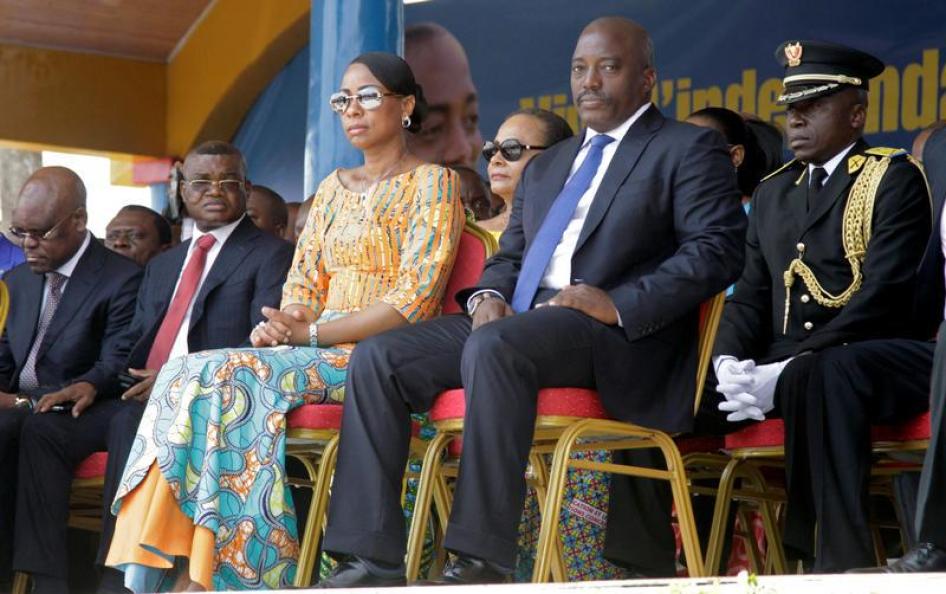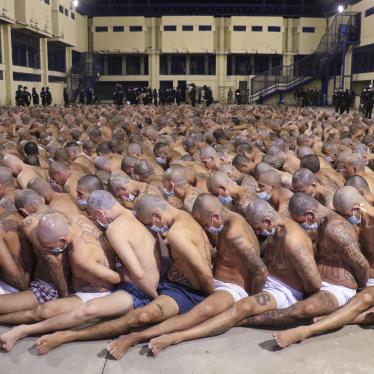(Kinshasa) – Democratic Republic of Congo authorities should investigate two recently dismissed intelligence officials for serious human rights violations. In March 2019, President Félix Tshisekedi removed Kalev Mutondo as director of the National Intelligence Agency (Agence nationale de renseignements, ANR), and Roger Kibelisa as head of the agency’s Department for Internal Security.
Under Mutondo and Kibelisa’s leadership, the National Intelligence Agency has been an instrument of political repression against opposition leaders and human rights and pro-democracy activists during the country’s protracted political crisis.Tshisekedi has appointed Kibelisa as an assistant to the president's special security adviser. It is unclear if Mutondo will be offered a new position.
“President Tshisekedi’s removal of Mutondo and Kibelisa could prove to be an important step toward ending systematic abuse by the Congolese intelligence services,” said Lewis Mudge, Central Africa director at Human Rights Watch. “But instead of giving the men new posts, the new administration should investigate their past actions and prosecute them as appropriate.”
Mutondo was a principal architect of the government’s drive to repress political dissent as then-President Joseph Kabila remained in power beyond the end of his constitutionally mandated two-term limit in December 2016. Human Rights Watch interviewed more than a dozen government officials, members of Kabila’s coalition, and security force officers who said that Mutondo played a central role in the government’s crackdown on pro-democracy youth activists and opposition leaders and supporters, as well as in orchestrating violence across the country, including in the restive central Kasai region.
The National Intelligence Agency held many of those arrested incommunicado for weeks or months, without charge and without access to their families or lawyers. Some were tried on fabricated charges, with Mutondo also allegedly playing a role in intimidating judges and dictating verdicts.
The National Intelligence Agency badly mistreated or tortured some of those detained in the crackdown, including with electric shocks and a form of near-drowning. Intelligence agents under Mutondo’s command also repeatedly intimidated, threatened, and harassed activists, journalists, and opposition leaders or supporters, apparently as part of a broader campaign to spread fear and curtail their work before national elections in December 2018. Mutondo was also allegedly implicated in the recruitment of ruling party youth to infiltrate opposition protests and spread violence and chaos.
The United States sanctioned Mutondo on December 12, 2016 for “undermining democratic processes,” and the European Union sanctioned him on May 29, 2017 for “planning, directing, or committing” serious human rights violations. The EU renewed its sanctions on Mutondo in December.
Kibelisa also played a critical role in the repression against activists and the opposition during the Kabila administration. Kibelisa’s office was located at an ANR building in Kinshasa known as the “3Z” detention center, where from 2015 to 2018 scores of political prisoners and activists were detained in inhumane conditions, and in many cases ill-treated or tortured. Families of detainees, lawyers, and human rights defenders were regularly denied access to the 3Z center under Kibelisa’s watch.
In 2016, the EU sanctioned Kibelisa for his role in suppressing the democratic process, directing human rights abuse, and inciting violence. The sanctions were renewed in December, before the presidential and legislative elections.
Tshisekedi’s decision to appoint Kibelisa to be assistant to the special security adviser indicates that he will not be investigated for past alleged abuses. While Mutondo has not to date been offered a position in the government, the appointment of Justin Inzun Kakiat, his deputy for many years, to replace him as ANR director further signals an unwillingness by the new administration to address impunity in the intelligence agencies. A thorough vetting of Kakiat’s role in past abuses should be carried out before he takes up the position, Human Rights Watch said.
“President Tshisekedi’s treatment of past rights abusers from the Kabila administration will say a great deal about the future direction of his administration,” Mudge said. “Will there be genuine accountability and reform or a continuation of Kabila’s repression, abuse, and impunity?”








